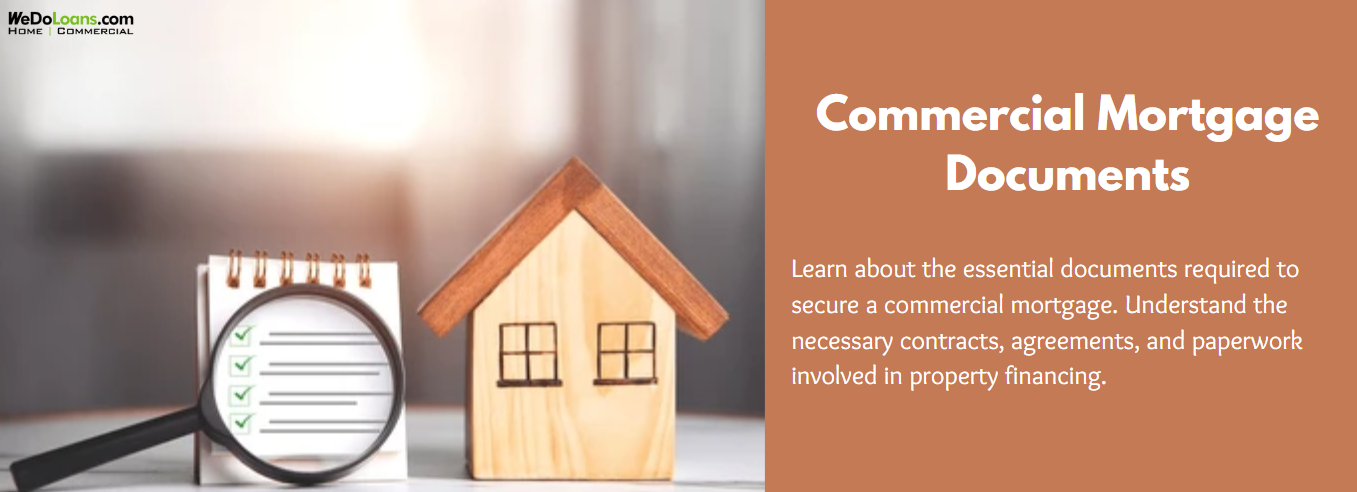
Applying for a commercial real estate loan is a detailed, multi-step process requiring various documents. Here’s what lenders typically need when approving and underwriting a loan for investment property.
What Commercial Real Estate Loan Documents Do You Need?
While the required documents can vary depending on the lender, property type, and loan type, the following are generally necessary for most loan applications:
Commercial Mortgage Documents: The Basics These fundamental documents are essential and usually the first you’ll submit:
- Loan Application: Initiates your loan application and typically includes basic personal, business, preliminary financial, and some property information.
- Purchase Sale Agreement (PSA): A signed copy of the purchase agreement between the buyer and seller, usually provided by the listing broker.
- Offering Memorandum (OM): A packet detailing the property, including listing price, key metrics, and pictures, typically furnished by the listing broker.
- Resume: A standard resume highlighting the business and investors’ real estate experience.
- Appraisal: Ordered by the lender to determine the property’s value; the fee is included in the loan costs.
Commercial Loan Documents: Financials Financial documents form the foundation of any commercial real estate loan underwriting process:
- Personal Financial Statement (PFS): Outlines your personal assets and liabilities to calculate net worth and assess liquidity.
- Business Tax Returns (BTS): Copies of your business’s federal tax returns for the last 2-3 years.
- Historic Profit & Loss Statements (P&Ls): Annual P&Ls showing revenues, expenses, and net operating income for the last 2-3 years.
- Current Profit & Loss Statement: Year-to-date P&L showing revenues, expenses, and operating income.
- Credit Scores: Both business and personal credit scores will be pulled if you’re personally guaranteeing the loan or if the business lacks an established credit history.
Commercial Loan Documents: Refinancing For refinancing, you’ll need the above documents plus:
- Current Mortgage Statement(s): Details on all outstanding loans and liens against the property being refinanced.
- Rent Roll: Information on current tenants, including lease details.
Additional Required Commercial Mortgage Documents Depending on the situation, lenders might also request:
- Environmental Reports: To ensure the property isn’t contaminated, especially if a previous business posed potential risks.
- Special Loan Application: Certain loan programs may have additional requirements, such as an energy assessment for energy efficiency loans or documentation for low-income housing loans.
Documents Needed To Apply For An SBA Loan The Small Business Administration (SBA) requires specific documents for their loan programs, generally including:
- SBA Loan Application: A detailed application covering the loan and business particulars.
- Business Plan: A comprehensive plan with strategy, financial projections, and other relevant information.
- Debt Schedule: Complete financial details on all existing business debts.
Why Do Commercial Lenders Need These Documents?
The purpose of these documents is to provide lenders with a clear understanding of the borrower’s financial standing, repayment ability, and the property’s potential value and risks. This helps lenders make informed decisions and mitigate potential losses.
Where To Get These Commercial Loan Documents
Personal and business financial documents usually come from your records, accountant, real estate agent, and/or attorney. Property-specific documents, like appraisals or environmental reports, are completed by specialized third-party professionals, with referrals often provided by your broker or lender.
Importance Of Accurate Loan Application Documents
All submitted documents must be accurate. Incorrect or misleading information can lead to delays, added scrutiny, or loan denial. Clear cases of fraud can result in legal consequences.
5 Ways To Improve Your Chances Of Getting Approved For A CRE Loan
- Enhance Your Credit Score: A higher credit score reassures lenders of your creditworthiness.
- Lower Your Debt Burden: A lower debt-to-income (DTI) ratio often leads to better loan terms and easier approval.
- Prepare a Robust Business Plan: A strong business plan can help sway lenders toward approval.
- Choose Properties Wisely: Select properties with strong cash flows, good condition, and in growing areas.
- Work with Experienced Brokers: Experienced brokers can guide you through the application process and address potential issues.
Conclusion
Securing a commercial real estate loan can be challenging, especially for newer investors. However, being well-prepared with the right documentation significantly increases your chances of approval. Once you understand what lenders look for, you can build a solid application to maximize your chances of success.
